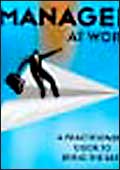 |
NAKED CONVERSATIONS
By Robert Scoble/Shel Israel
Wiley India
Pp: 251
Price: Rs 349 |
Compared
to what it was five or six years ago, Microsoft's public image
today could be said to be, if not genial, far less diabolical.
True, for a company that remains the predominant supplier of operating
systems for desktop computing it is still difficult to shake off
the epithet "Evil Empire". Yet Microsoft is not seen
to be as feared a juggernaut as it once used to be. One factor
for the change is certainly the company's own public policy that
is now far less combative and more conciliatory-Bill Gates' own
public pronouncements, even when he talks about the competition,
are more benevolent than confrontational. It helps too that Gates'
charitable initiatives win him and his company tons of brownie
points that, consequently, influence how the public looks at Microsoft.
Yet, there may be a not-quite-measurable factor that may have
contributed to the ogre-to-not-too-bad image transition. If you
believe Robert Scoble, it is by allowing (indeed, patronising)
its employees to blog. Thousands of Microsoftians blog but Scoble
(who quit the software giant last year) was the star among them.
His blog (www.scobleizer.com) became one of the web's most popular.
Reason: his employers never filtered it or spun it to suit their
own pr needs.
Who better than Scoble to do a book that advises companies and
businesses on how to use blogs to make things better? Scoble and
Shel Israel (a technology innovator) have written Naked Conversations
as a business book. In fact, while working on it, they uploaded
every chapter as it was written on a blog before it was published.
Meant to be a business book, Naked Conversations, besides making
a case for the benefits of business blogging, is useful as a primer
to those uninitiated in the practice of blogging. Indeed, it is
a sort of diy guide to business blogging, peppered with heaps
of anecdotal evidence of how companies (mainly in the us) have
reaped the benefits in terms of burnishing their image (like Microsoft),
advertising their services or just being able to communicate better
with their customers. Business blogging, the authors demonstrate,
works and the faster you adopt it the better it is for your business.
Still, although Scoble and Israel have tried to make their book
a useful tool for would-be business bloggers (including tips on
how not to run afoul of company policies while blogging as an
employee), corporate or business bloggers will always run the
risk of being seen as undercover representatives of the businesses
they work for. In many parts of the blogosphere where individualism
rules, sometimes that could be too high a price to pay.
 |
MANAGER AT WORK CREATIVITY@
WORK
By S. Ramachander
Penguin Portfolio; Response Books
Pp: 239; 203
Price: Rs 350; Rs 320 |
Manager at work is
an ambitious attempt by S. Ramachander to address the whole gamut
of issues that managers face at work. At the centre of it is the
author's proposition that the business environment today is far
more complex and dynamic than before, and that the manager must
keep learning. "The purpose of the book," writes the
author, an executive-turned-acamedic-turned-writer, "is to
enable you as a manager to reflect and ponder, and equip yourself
for such learning, lifelong rather than just to pass on a few
shrink-wrapped ideas." Young managers who haven't read much
of management writing would benefit from this all-encompassing
book, which covers everything from marketing to people and organisation
development.
The other book, Creativity at Work, is far more focussed and
possibly for that reason, reads much better. The author's tone
and examples are much more engaging. In Manager, Ramachander's
attempt was to encourage the executive to keep learning. In Creativity,
he is urging them to look within for creative answers to their
everyday problems. "Developing the eyes to see differently
is what this book is focussed on," says the author. Therefore,
the focus is on training oneself to "see, think and act in
a more creative manner". Between the two, Creativity is a
far better read.
|






